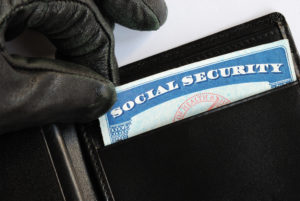
In an increasingly digital world, identity theft is on the rise. Before, stealing an identity typically required an involved process of copying information or taking vital documents to be used for personal gain. Most identity theft occurs online or when a person’s information is stored and accessed digitally.
Identity theft carries substantial criminal and civil penalties and should be taken very seriously. At the Simmrin Law Group, our Long Beach identity theft lawyer will help you through this.
What Constitutes Identity Theft in California
California Penal Code 530.5 PC is the statute regulating criminal acts of identity theft in the State of California. Identity theft can be charged as either a misdemeanor or a felony, depending on the severity of the theft. To be charged with identity theft, a criminal offender must have been found unlawfully using another person’s personal information to purchase goods, services, or property or establish a line of credit without their knowledge and consent.
For a free legal consultation with an identity theft lawyer serving Long Beach, call (310) 896-2723
Types of Identity Theft
California law identifies four distinct types of identity theft, including:
- Using another person’s information unlawfully without their consent.
- Using another person’s information without their consent to commit fraud.
- Using another person’s information to sell, transfer, or convey personal property without the person’s consent.
- The sale, transfer, or conveyance of another person’s personal information to commit fraud without the other person’s consent.
Contrary to popular belief, the simple act of obtaining a person’s personal information does not necessarily constitute identity theft. Instead, a prosecutor must show that the person was possessing the other person’s information and intended to use the information unlawfully or fraudulently.
Long Beach Identity Theft Lawyer Near Me (310) 896-2723
Types of Information Used in Identity Theft
Although obtaining certain personal information like names, birthdays, addresses, and phone numbers are relatively straightforward, possessing that information is not always enough to prove identity theft. Instead, a finding of identity theft includes the above information and typically additional information like a social security number, tax information number, government-issued photo I.D. (driver’s license or passport), employee identification number, bank statements with an account number, and credit card information (card number, expiration date, and pin number).
Click to contact our Long Beach Criminal Defense Lawyers today
Federal Identity Theft Charges
California residents accused of committing identity theft always run the risk of being charged locally, federally, or both, depending on the facts of their particular case. The U.S. Department of Justice (DOJ) often becomes involved in identity theft cases when alleged criminal conduct crosses state boundaries, involves vast sums of money or personal information, or involves financial banking crime. DOJ defines identity theft as the unauthorized or attempted misuse of an existing financial account to open a new financial account or commit fraud.
Complete a Free Case Evaluation form now
Identity Theft Conviction Penalties
Identity theft can carry a range of varying penalties in California. Although many judges use discretion when levying punishment based on an offender’s criminal background and the facts of the case, the penalties are apparent.
The maximum penalty for a misdemeanor identity theft charge is one year in county jail and a $1,000 fine. Further, the maximum penalty for a felony identity theft charge can go up to three years in a state facility and a $10,000 fine.
Under federal law, a person charged and convicted with using another person’s identity information for unlawful purposes, providing a third person with stolen identity information, or using someone’s identity to falsify documents can incur severe punishment. Offenders face tens of thousands of dollars in fines and up to 30 years in federal prison.
Defenses to Identity Theft
Generally, the only defense to an identity theft charge is to disprove one or more elements of the offense. In most cases, this boils down to disproving evidence of an alleged offender’s reasoning behind possessing the victim’s information.
Based on the evidence provided by the prosecution, an alleged offender will be charged with identity theft on the theory the accused indented to use the information in an unlawful manner or fraud. Some successful defenses demonstrate evidence that the alleged offender may have possessed the information, but they had no intention of using it for fraudulent or unlawful means.
The Legal Services an Identity Theft Lawyer in Long Beach Offers
Criminal defense is always a long and involved process for all parties, which is why the best lawyers focus on client-centric outcomes by zealous advocating for their client’s interests. Below are the types of services a defendant should expect.
Proving the Elements of a Criminal Act
To successfully convict the accused of a crime, a prosecutor must be able to prove all requested elements of that crime beyond a reasonable doubt. This means that when the factfinder (a judge or jury) has heard a case at trial, there must be no doubt that the accused committed the crime. Because the majority of identity theft cases hinge on a person’s intended purpose when found in possession of personal information, most legal strategies focus on that point.
Pre-Trial Motions, Discovery and Legal Strategy
Before the trial, an identity theft attorney in Long Beach will gather all evidence relevant to the case, including financial documentation, transaction details, a timeline of events, and critical witness testimony through discovery. During discovery, the lawyer will advocate on the accused’s behalf during pre-trial motions when determining the evidence that may be presented at trial.
A criminal defense lawyer will also craft a legal defense strategy for trial, procure and evaluate expert witness testimony, and confer with prosecutors to address logistical issues. A quality criminal defense lawyer will always entertain and negotiate over plea bargains to potentially reduce criminal punishment and avoid costly and time-consuming formal legal procedures. However, the lawyer cannot take a plea bargain on their client’s behalf without the client’s cooperation and consent.
Trial and Appeal
If a case reaches the trial phase, a criminal defense lawyer can argue the case in front of a judge or jury. Trials encompass selecting a jury, final motions to outline the use or exclusion of certain pieces of evidence, examining and cross-examining witnesses on the stand, and arguing post-trial motions. Many criminal defense lawyers can also appeal cases on behalf of their clients or refer the client to a more suitable legal advocate based on numerous factors.
Call a Long Beach Identity Theft Lawyer Today
If you are facing an identity theft charge, the team at the Simmrin Law Group is ready to step in and formulate your defense strategy today. We have the resources necessary to handle every aspect of your case, and we have no problem defending you at trial if necessary. Let a Long Beach identity theft attorney get to work on your case today.
Call or text (310) 896-2723 or complete a Free Case Evaluation form


